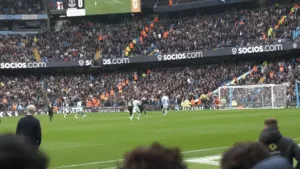There are football clubs that compete for trophies, and then there are clubs that compete with the future. Manchester City belong to the second category — a team that didn’t simply grow; they engineered themselves upward. Nothing about their rise feels accidental. It feels like the outcome of a long-term plan built on patience, structure, and a fearless refusal to accept the limits of “how things are done.” City do not just participate in the modern game. They redefine its standard and silently dare others to catch up.

What makes City fascinating isn’t just the success, but the consistency behind it — the way the club behaves as though each season is part of a much bigger architectural blueprint. Where other clubs react emotionally to pressure, City adjust quietly, like a well-calibrated engine smoothing itself mid-flight. The ethos is simple but powerful: build the right system first, and success will eventually become the by-product.
✅ WordPress-Ready Club Information Table
<table>
<thead>
<tr>
<th>Category</th>
<th>Details</th>
</tr>
</thead>
<tbody>
<tr>
<td>Full Name</td>
<td>Manchester City Football Club</td>
</tr>
<tr>
<td>Founded</td>
<td>1880 (as St. Mark's); renamed Manchester City in 1894</td>
</tr>
<tr>
<td>Stadium</td>
<td>Etihad Stadium, Manchester, England</td>
</tr>
<tr>
<td>Manager</td>
<td>Pep Guardiola</td>
</tr>
<tr>
<td>Leagues</td>
<td>Premier League, UEFA Champions League, FA Cup, EFL Cup</td>
</tr>
<tr>
<td>Training Ground</td>
<td>Etihad Campus</td>
</tr>
<tr>
<td>Nicknames</td>
<td>City, The Sky Blues, Cityzens</td>
</tr>
<tr>
<td>Official Website</td>
<td><a href="https://www.mancity.com" target="_blank">https://www.mancity.com</a></td>
</tr>
</tbody>
</table>
City’s success is often explained away with a lazy answer — “they have money.” But money alone has never guaranteed order. Clubs with even deeper pockets have wasted decades chasing identity while City quietly built one. Their recruitment strategy is not about headlines but compatibility. They scout for players who think fast, adapt quickly, and buy fully into a system that demands intelligence as much as raw talent. They look for footballers who can understand space, not just run into it.
Pep Guardiola has intensified that philosophy. He hasn’t just coached City — he has conditioned them into a pattern of thought. Under him, pressing is not panic and possession is not vanity; both are forms of control. The team plays like a rehearsed symphony: positional, patient, endlessly circulating the ball until cracks appear. By integrating data-driven decisions with tactical principles, City have effectively built a style of play that feels inevitable once it begins flowing.
Even when they lose — as seen recently in tight fixtures — they rarely feel shaken. That’s because their security doesn’t come from a star striker or a single moment of magic. It lives in the structure. A narrow defeat does not undermine the plan; it simply forces the next iteration. For a club that learned to think in seasons rather than weekends, setbacks are not endings — just recalibrations.
At academy level, the ethos is mirrored. Young players are taught how to read tempo, not just chase it. They learn positioning as early as they learn dribbling. The Etihad Campus is more than a training ground — it’s a development laboratory. The goal is continuity: the senior team is not a destination, but a natural extension of the pathway.
This is why City feel sustainable in a way few dynasties do. They are not obsessed with dominance for its own sake; they are obsessed with evolution. Their biggest rivalry isn’t with Arsenal, Liverpool, or United — it’s with the next version of themselves. The club upgrades its philosophy before the rest of the league even identifies the trend.
Looking forward, Manchester City’s legacy may echo beyond trophies. They are slowly redefining what a “modern superclub” looks like — not an empire built on noise and chaos, but on intelligence, rhythm, and structure. They’ve made excellence feel methodical instead of miraculous, and in doing so, changed the tone of what greatness in football looks like.
In a sport that is often emotional, volatile, and unpredictable, City’s calmness sometimes feels surreal — a quiet confidence that comes from knowing they are constructing something meant to last. The question is no longer whether this model works. The question is who, if anyone, can replicate it.
